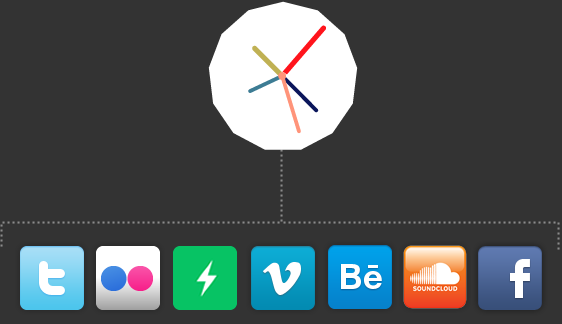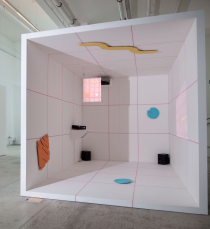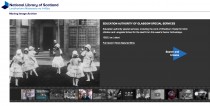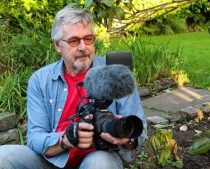Andrew Kötting is one of the few artist filmmakers in the UK whose work explores and challenges both the cinema and gallery space. This week his third feature film, Ivul, comes to British cinemas. Through a loose narrative structure and limited dialogue it explores a lyrical treetop landscape where a teenage boy has banished himself to following an argument with his father.
Kötting talks to Central Station about the themes present in his latest film, why he still prefers the creative community in the UK (despite his latest film having been shot in France) and his next project which involves pedaling a giant swan pedalo from Hastings to Hackney.
Your latest film Ivul is the second part of a trilogy following on from This Filthy Earth (2001) – tell me how this film relates to the other two?
I think half way through [making This Filthy Earth] I had the sense that we could perhaps open it a little bit and make another piece of work which is earth or landscape related, I think all my work is inspired by the landscape and about the landscape. It seemed to connect with this other shoot I’d been commissioned to work on for BBC Scotland at the time, the story there was really inspired by my tree-climbing escapades as a kid. I suddenly thought, hang on, there’s a beginning here of a trilogy: one of which is set very much on the ground and this one was going to be set very much off the ground and the third part which would be a piece of work that would be set beneath the ground. So that’s how it evolved.
There’s a character in Ivul called Lek who’s quite mysterious, quite enigmatic and he’s the same actor and the same character I was working with in This Filthy Earth so I’d love to work with him again and design the third part, the subterranean part, around his character. Perversely he’s a French character who’s classically trained and is used to working with a lot of dialogue and yet in both This Filthy Earth and Ivul I deprived him of language. The idea of the third part of the trilogy would be to construct a monologue around his experiences of having been in the two films, not literally, but as the character, and what he’s seen as he enters the underworld, [in] a Cocteau-esque vein. I’d like to give him the ability to reflect, I guess in a metaphysical way, on the earth and landscape in general.
And you made the film in France…
Yeah, it’s a French Swiss production. Initially it was going to be a UK-French production but we could never really get the funds together here. I had a bit of a fan base in France and also in Switzerland. The people that run Box Productions, a Swiss production company, had programmed my work and were very familiar with it from way back when I just started out and I had a couple of short film retrospectives in Lausanne. There was a connection there and eventually we got the script to the actor Jean-Luc Bideau, who they felt would make a really good Andrei Ivul. He carries a lot of clout and I think as soon as he fell in love with the project the Swiss money was very easy to acquire.
Many directors have expressed frustrations at working within the British film industry, in particular in securing funding. Did you find that it was easier working abroad?
It would be nice to say yes but I’ve always been outside of the industry. I’ve been very lucky in the sense that I made Gallivant (1997) which was a feature-length project with the BFI, sadly the production ring of the British Film Institute closed but then I was lucky to have got This Filthy Earth off the ground through the Film 4 lab. Most of my work is outside of the industry, I’ve always looked at it as some kind of weird gulag and I’ve always been beyond the perimeter fence. Most of the work I’ve made in the last twenty-five years has been as much geared towards a gallery, installation, performance and occasionally I get to make a feature-length project. I’ve never really been that frustrated.
Working both in France and the UK do you notice different approaches towards the arts between the countries?
They have a far healthier funding community, they’re always putting money into festivals and short films, you get development money and so on and with that comes a sort of rigour and professionalism that can be quite intimidating. As a result, sadly, I’ve sat on juries in France and the work that seems to come out is of a particular style that is far less experimental. My background is in performance, structuralist filmmakers and materialist filmmakers and I feel that what happens here in the UK is infinitely more interesting. The work over there seems to be narrative driven and there seems to be very little experimentation or hybrid visionary voices. Whereas over here we do have a plethora of people who have moved on either to feature films or have been happy to work within alternative spaces, like Matt Hulse and Ben Rivers and even Clio Barnard who’s about to have her first feature released which is called The Arbor. I feel that the work over here is harder to get funding for but it’s a lot more interesting.
Your work has been known to explore this notion of Britishness – do you see this theme present in Ivul even though it was shot abroad?
That’s a hard one. The story originally was to be shot on the Island of Jura in the Hebrides and I think if this story had been told up there it would have come across as being something quite British and eccentric and odd and the French and the Swiss would think ‘that’s a very quirky story’. As soon as the story was transposed to the French Pyrenees it gives it a very different feeling. There’s always a sense of people getting very frustrated by the work because they want to know where it is whereas I’m very careful to make sure the realities I’m creating are poetic realities. It’s very hard to think, where is this manor house? Where is this forest? Where’s the story unfolding? I think it’s outside any British or Englishness, it’s just a world that I try to create. Maybe it’s quite dark, there’s something very absurdist about the work and that comes from a sense of Britishness, you know there’s a smidgen of The Goons and Monty Python and certainly Vic and Bob in there. There’s always something dark and menacing and foreboding and yet funny.
Another idea explored in the film is the relationship between the father and son – do you see this as a key theme?
I think it’s there as a theme but I think the vital theme, the catalyst, is the sister being in love with the idea that the brother is in love with her. For me the father figure is based on the father figure I wish I’d had. I loved the idea of having a father that was wantonly eccentric and ‘other’. His back story is always enigmatic and unclear but he’s from Russia he’s an emigree who’s arrived in this part of the world. I was very interested in that. Yet to a certain extent there was also elements of King Lear. He’s obviously madly in love with his daughter and son and what happens through this cocooning, this hermetically sealed world [is that] this tragedy unfolds. Without the sense of closeness and bonding with the family the tragedy wouldn’t resonate as much. Albeit that the story’s very simple I’d like to think there’s other meta-stories at work around the disintegration of the family.
Gareth Evans has said your “features to date stand in significant opposition to almost all contemporary British production”. Has this been a conscious desire on your part? And where do you see your work sitting in the bigger picture of artists’ film?
It’s very hard to locate, it certainly sits outside the industry. Shane Meadows arrived with a mini feature up in Edinburgh when I arrived with a short. He was feted in the same way that I was feted. I was never that interested in the conventions of narrative storytelling and all my earlier work and even the work I do now is as informed by non-narrative pieces, what I call implied narrative, so there’s always more than one narrative at work. When you’re editing you’re putting bits together and that takes you on a very different journey in terms of the making of it. It can be very potent, it can also be very infuriating I think because most people that go to the cinema sit down and they want to be taken from A to B to C, they want there to be drama. I’m not doing it by design but I don’t feel that I’m interested in trying to make that kind of work. I guess the work has always sat outside of that arena, certainly in terms of work that’s being funded in the UK.
At the same time sometimes it’s difficult for gallerists or curators, they also find the work maybe too narrative, too linear, there is too much going on which is driven by the experience of single screen to really appreciate or support the idea of it being deconstructed and represented in a gallery space. All the work I’ve been making works both as single screen and there are versions which start working in a gallery. It’s what I call a deconstruction of the story [with] notions of expanded cinematic language. It’s something that belongs to the cinema yet it’s not, it’s as important to wander into this space and out of this space without feeling you have to sit down and have the front credits and the end credits.
You also did a project called mapping perception which worked across media and had an online/digital element. Do you feel excited by the opportunities that the digital medium can offer?
Very much so – with technology now you can digitally run videos on loops, things can be interactive, there can be sensors which trigger images or sounds within the space and all this is what I was experimenting with with mapping perception. It’s something I’ve continued to explore with other works since then, especially a bigger project called In the Wake of a Dead Dad which is very sculptural, it’s wantonly Dada, a kind of travelogue closer to Gallivant (1997).
And a new project I’ve been working on which straddles the gallery space and the cinematic space too, is called Swan Down. It’s something I’ve been working towards for 2 or 3 years now, it’s a project whereby I’m proposing to pedal a giant swan-shaped pedalo from Hastings to Hackney. It’s a waterbound journey in a very Herzogian Fitzcarraldo sort of way. It’s a performance, a happening which will be documented and presented on the website and I hope there’s a feature length project there too.
Ivul is on selected release in cinemas from 23 July 2010.
You can find out more about Andrew Kötting at Lux Online and his Swan Down project at www.swandown.info














Comments